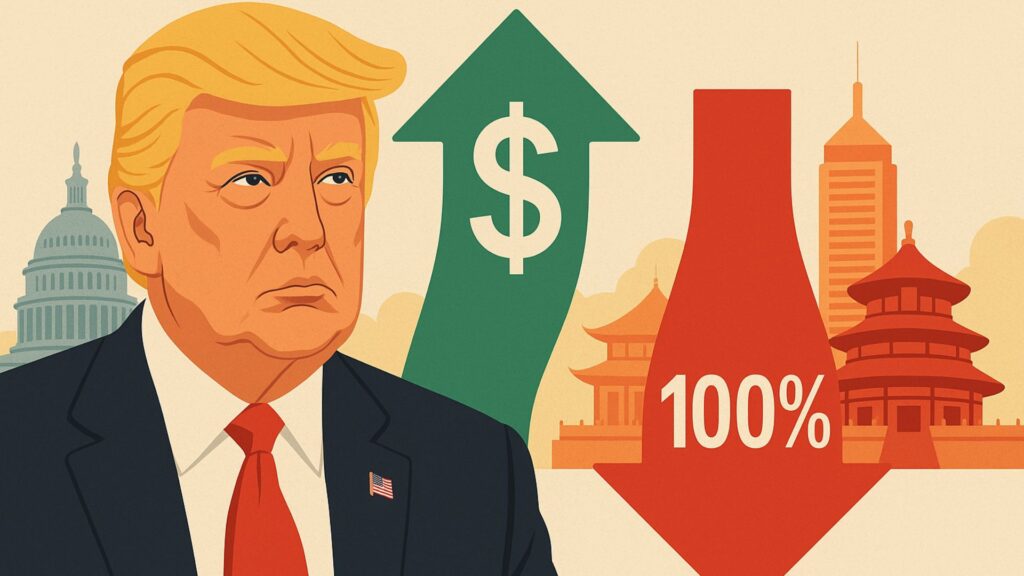President Donald Trump has signalled a possible reduction in tariffs on Chinese imports while simultaneously introducing a 100% tariff on foreign-made American films. The two decisions show a conflicting stance on global trade.
While one opens a door to renewed cooperation with China, the other threatens to deepen the cultural rift between the two countries. The implications may stretch beyond trade, affecting markets, entertainment, and broader international relations.
Trump Considers Tariff Cut to Reopen Trade with China
During an interview on Meet the Press, Trump said he was open to reducing existing US tariffs on Chinese goods. These tariffs reach as high as 145%, with China retaliating with up to 125% on US imports.
Both countries have suffered under these measures, with disrupted supply chains and higher costs passed on to businesses and consumers. Now, with China showing readiness to talk, the tone appears to be shifting.
A renewed dialogue may support industries such as agriculture, consumer electronics, and industrial equipment, which are highly dependent on US-China trade.
Trade economist David Stahlman called the signals “positive,” noting that businesses on both sides are looking for clarity and stability after years of volatility.
Such tariff changes could also impact the financial and technology sectors. Reduced trade tension may encourage more cross-border investment and regulatory easing, especially in areas like fintech and blockchain.
An analyst observed that similar moments in the past have led to greater cooperation in developing digital infrastructure. This could benefit companies operating in digital currencies and decentralised finance.
Market data from CoinMarketCap shows that Huobi Token (HT) has lost 34.55% of its value over the past month, despite an extraordinary 15742100.43% increase over 60 days. Its 24-hour trading volume is down 1.58%. These swings reflect how sensitive digital assets can be to broader political and economic developments. A renewed trade relationship with China could support more stable conditions for investors in the digital sector.
Trump’s willingness to negotiate with China marks a notable change in tone. However, this openness does not extend to all industries. In the same week, he took a hard stance on American film productions made abroad.
Foreign Film Productions Face 100% Tariff as Hollywood Loses Ground
In a post on Truth Social, Trump announced a new 100% tariff on American films produced outside the US.
He claimed these productions, often referred to as runaway films, were weakening national security and damaging the domestic film industry. His post described the move as urgent and necessary to preserve American jobs and values, although no timeline for enforcement was given.
The timing coincides with a decision by China’s Film Administration to cut the number of US films allowed into its theatres.
This policy, announced on April 10, was seen as a response to earlier US proposals targeting imported entertainment. China stated that the US had been using tariffs to suppress legitimate industries, prompting it to protect its market.
The outcome is that US films are losing ground in the Chinese market. In 2018, American movies made up 36% of China’s box office revenue. By 2024, that figure had dropped to 14%.
Audiences in China are increasingly choosing local films, and experts note growing fatigue with Hollywood’s focus on sequels and formulaic storytelling.
The 100% tariff will make it significantly more expensive to distribute foreign-made American films in the US. This is especially troubling for studios like Disney and Warner Bros., which often film overseas to reduce costs and rely on international markets for revenue.
The policy could lead to fewer international collaborations and reduced access to foreign locations and incentives.
Some in the industry are proposing solutions. Actor Jon Voight and his manager, Steven Paul, are reportedly preparing a plan to support domestic film production.
Although details are not public, it may include tax breaks for films made within the US. This approach would align with Trump’s desire to bring production back to American soil.
Hollywood is already under pressure. The industry continues to recover from COVID-related disruptions, writers’ strikes, and rising production costs.
Losing access to major markets like China while facing higher costs at home could further strain budgets. There is also a cultural cost. Critics warn that these policies could reduce the variety of stories available in US cinemas and isolate American audiences from international content.
Trump’s announcement did not include the streaming and television sectors. However, if tariffs are extended to digital productions, the effect could be widespread, limiting the availability of global entertainment for US viewers and raising concerns over censorship and access.
Conclusion
Trump’s approach to trade this week highlights competing priorities. On one hand, he is considering lower tariffs on Chinese goods, which could improve economic ties and benefit several industries.
On the other hand, he is imposing strict new tariffs on foreign-made American films, a move that could hurt Hollywood and escalate cultural tensions with China.
As negotiations continue and new policies unfold, the impact will be closely watched by businesses, investors, and audiences on both sides of the Pacific.

